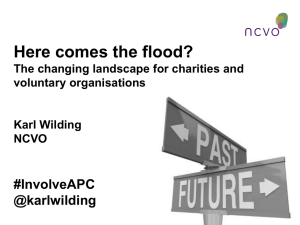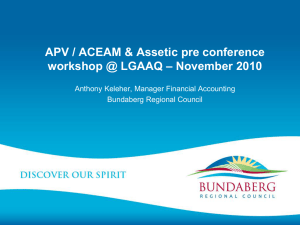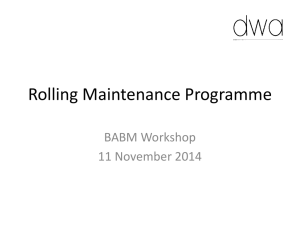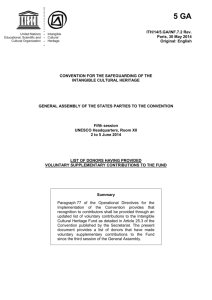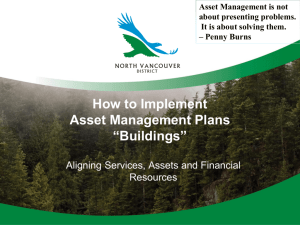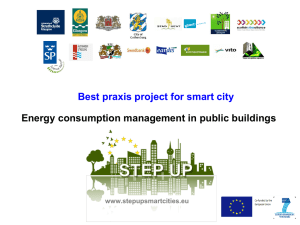John Kerridge presentation
advertisement
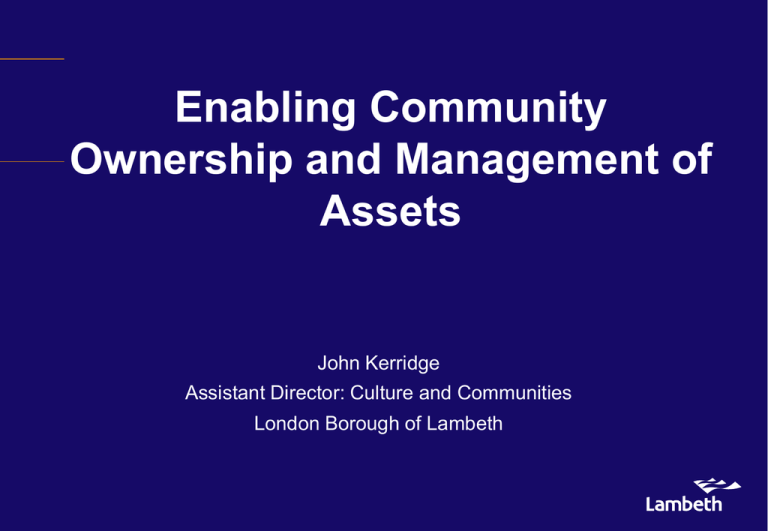
Enabling Community Ownership and Management of Assets John Kerridge Assistant Director: Culture and Communities London Borough of Lambeth Our Journey (so far) Getting our house in order! December 2010: Commissioned audit of groups in occupancy of Council owned building (Community Matters) December 2011: we opened consultation on proposals to develop a network of community hubs over the next 4 years. April 2012: Close of consultation July 2012: Cabinet report agreed the following: 1. The strategic vision and direction. 2. A community asset plan. 3. Capacity building support targeted at groups managing building October 2012: A new ‘enabling community asset ownership and management’ Our Journey has just started! Establishing the debate Ambition ‘The Council seeks to enable an increase in the Community ownership and management of assets within neighbourhoods throughout the London Borough of Lambeth – to stimulate the creation of new social markets, underpin robust community enterprise capable of delivering high quality local services and provide residents with new learning and employment opportunities.’ Way of working Codesign/coproduction: A transformative way of thinking about power, resources, risks and outcomes, but not a single magic solution Sharing information Being honest (Councils cannot provide all the solutions, answers and there will be difficult decisions to make) But taking tough decisions within an overall framework that also provided impact mitigation and opportunities Being clear about accountabilities and responsbilities Context and Challenges Context and Challenges (1) • Council needs to save £90m+ over 4 years • Our current policy of providing buildings to voluntary and community groups is unsustainable • A lack of building ownership within the voluntary and community sector – how do we change this? • Solutions will need to be coproduced, including the attraction of external investment into buildings • New communities and their building requirements • No easy solutions, but there remains opportunities if we work together Context and Challenges (2) • There are approximately 100 voluntary and community sector groups occupying council owned buildings • The estimated value of these buildings is around £20m • Estimated required investment £5m • Many excellent examples of VCS tenants • Small number of groups refusing to enter into lease agreement for occupancy or unwilling to pay rent unless they receive a grant from the Council • Estimated rental income £1.5m actual £800k Policies and Investment Policy Based on Outcomes • An increase in the sustainable ownership of buildings within the voluntary and community sector • The Council ceasing to provide this area of service within the next 4 years through its commercial portfolio • Creating new platforms for coproduction of service through community hubs • Facilitating and maximising investment • Delivery savings • Securing capital receipts to enable reinvestment • A new ‘enabling community asset ownership and management’ Purpose of Policy • Describes how we intend to increase community ownership and management of assets, which are consistent with the cooperative council ethos: • The Meanwhile Use of Assets • Community Asset Transfer • The Community Right to Bid or ‘Assets of Community Value’ Provisions • The Community Right to Reclaim Land, and • Compulsory Purchase for Communities Community Asset Plan Type of investment To stimulate additional supply of office/unit/flexi hot desks Council owned property earmarked for asset transfer under new policy Estimate Value £350,000 £1.2m Capital recipients earmarked for investment (utilising libraries and other community buildings) £7m Property occupied by voluntary and community sector groups remaining in Council ownership valued £3.4 Council building earmarked for community hubs £10.4m Capacity Building • Agreed £160,000 of community capacity building support over the next 2 years • Lambeth Voluntary Action Council and Community Matters now working up the level and type of community capacity building support.



